英语修辞法梳理
- 格式:doc
- 大小:54.00 KB
- 文档页数:10
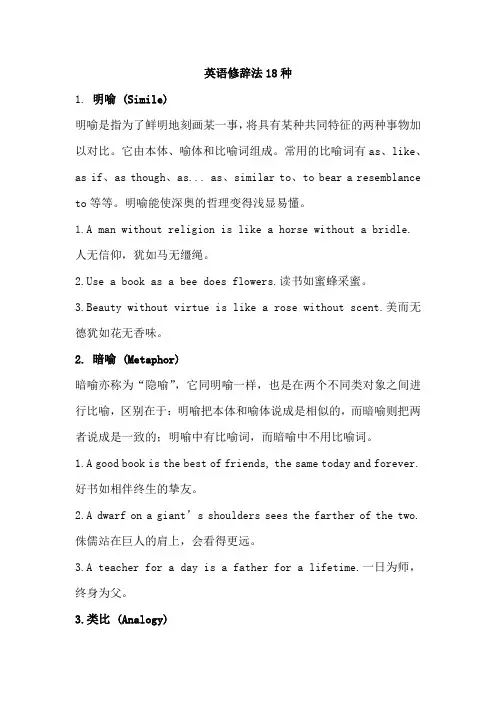
英语修辞法18种1. 明喻 (Simile)明喻是指为了鲜明地刻画某一事,将具有某种共同特征的两种事物加以对比。
它由本体、喻体和比喻词组成。
常用的比喻词有as、like、as if、as though、as... as、similar to、to bear a resemblance to等等。
明喻能使深奥的哲理变得浅显易懂。
1.A man without religion is like a horse without a bridle. 人无信仰,犹如马无缰绳。
e a book as a bee does flowers.读书如蜜蜂采蜜。
3.Beauty without virtue is like a rose without scent.美而无德犹如花无香味。
2. 暗喻 (Metaphor)暗喻亦称为“隐喻”,它同明喻一样,也是在两个不同类对象之间进行比喻,区别在于:明喻把本体和喻体说成是相似的,而暗喻则把两者说成是一致的;明喻中有比喻词,而暗喻中不用比喻词。
1.A good book is the best of friends, the same today and forever. 好书如相伴终生的挚友。
2.A dwarf on a giant’s shoulders sees the farther of the two.侏儒站在巨人的肩上,会看得更远。
3.A teacher for a day is a father for a lifetime.一日为师,终身为父。
3.类比 (Analogy)类比是一种阐述事理的修辞格,即用人们熟悉的事例说明较深的道理,或通过具体形象阐明抽象的概念。
它主要是把两种本质上不同的事物之间的共同点加以比较。
1.Judicious praise is to children what the sun is to flowers. 明智的赞扬对于孩子的作用,就像阳光对于花朵的作用一样。
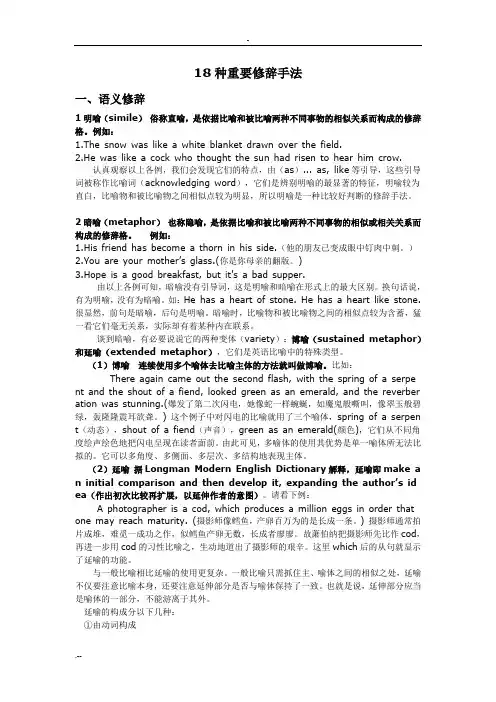
18种重要修辞手法一、语义修辞1明喻(simile)俗称直喻,是依据比喻和被比喻两种不同事物的相似关系而构成的修辞格。
例如:1.The snow was like a white blanket drawn over the field.2.He was like a cock who thought the sun had risen to hear him crow.认真观察以上各例,我们会发现它们的特点,由(as)... as, like等引导,这些引导词被称作比喻词(acknowledging word),它们是辨别明喻的最显著的特征,明喻较为直白,比喻物和被比喻物之间相似点较为明显,所以明喻是一种比较好判断的修辞手法。
2暗喻(metaphor)也称隐喻,是依据比喻和被比喻两种不同事物的相似或相关关系而构成的修辞格。
例如:1.His friend has become a thorn in his side.(他的朋友已变成眼中钉肉中刺。
)2.You are your mother’s glass.(你是你母亲的翻版。
)3.Hope is a good br eakfast, but it’s a bad supper.由以上各例可知,暗喻没有引导词,这是明喻和暗喻在形式上的最大区别。
换句话说,有为明喻,没有为暗喻。
如:He has a heart of stone. He has a heart like stone.很显然,前句是暗喻,后句是明喻。
暗喻时,比喻物和被比喻物之间的相似点较为含蓄,猛一看它们毫无关系,实际却有着某种内在联系。
谈到暗喻,有必要说说它的两种变体(variety):博喻(sustained metaphor)和延喻(extended metaphor),它们是英语比喻中的特殊类型。
(1)博喻连续使用多个喻体去比喻主体的方法就叫做博喻。
比如:There again came out the second flash, with the spring of a serpe nt and the shout of a fiend, looked green as an emerald, and the reverber ation was stunning.(爆发了第二次闪电,她像蛇一样蜿蜒,如魔鬼般嘶叫,像翠玉般碧绿,轰隆隆震耳欲聋。

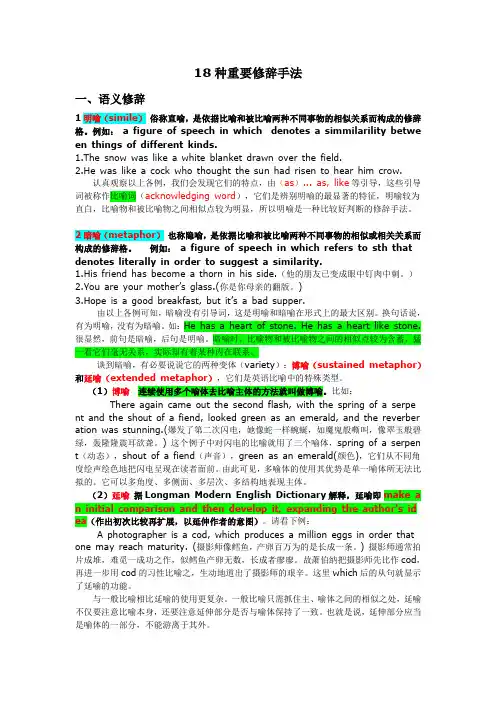
18种重要修辞手法一、语义修辞1明喻(simile)俗称直喻,是依据比喻和被比喻两种不同事物的相似关系而构成的修辞格。
例如:a figure of speech in which denotes a simmilarility betwe en things of different kinds.1.The snow was like a white blanket drawn over the field.2.He was like a cock who thought the sun had risen to hear him crow.认真观察以上各例,我们会发现它们的特点,由(as)... as, like等引导,这些引导词被称作比喻词(acknowledging word),它们是辨别明喻的最显著的特征,明喻较为直白,比喻物和被比喻物之间相似点较为明显,所以明喻是一种比较好判断的修辞手法。
2暗喻(metaphor)也称隐喻,是依据比喻和被比喻两种不同事物的相似或相关关系而构成的修辞格。
例如:a figure of speech in which refers to sth that denotes literally in order to suggest a similarity.1.His friend has become a thorn in his side.(他的朋友已变成眼中钉肉中刺。
)2.You are your mother’s glass.(你是你母亲的翻版。
)3.Hope is a good breakfast, but it’s a bad supper.由以上各例可知,暗喻没有引导词,这是明喻和暗喻在形式上的最大区别。
换句话说,有为明喻,没有为暗喻。
如:He has a heart of stone. He has a heart like stone.很显然,前句是暗喻,后句是明喻。
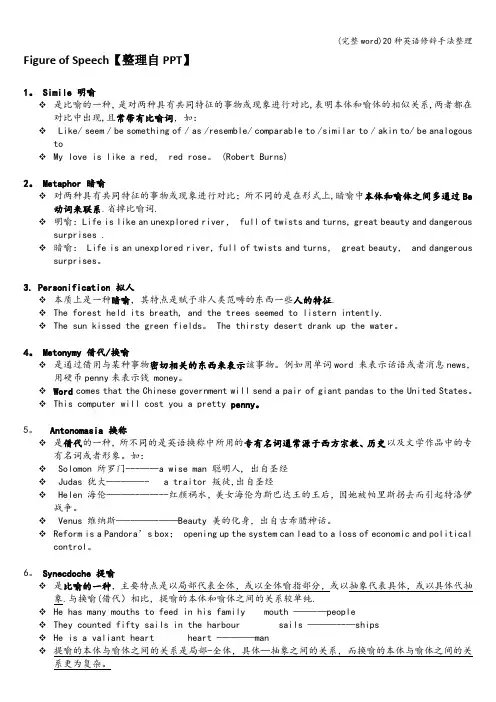
Figure of Speech【整理自PPT】1。
Simile 明喻❖是比喻的一种,是对两种具有共同特征的事物或现象进行对比,表明本体和喻体的相似关系,两者都在对比中出现,且常带有比喻词,如:❖ Like/ seem / be something of / as /resemble/ comparable to /similar to / akin to/ be analogous to❖My love is like a red, red rose。
(Robert Burns)2。
Metaphor 暗喻❖对两种具有共同特征的事物或现象进行对比;所不同的是在形式上,暗喻中本体和喻体之间多通过Be 动词来联系.省掉比喻词.❖明喻:Life is like an unexplored river, full of twists and turns, great beauty and dangerous surprises .❖暗喻: Life is an unexplored river, full of twists and turns, great beauty, and dangerous surprises。
3. Personification 拟人❖本质上是一种暗喻,其特点是赋予非人类范畴的东西一些人的特征.❖The forest held its breath, and the trees seemed to listern intently.❖The sun kissed the green fields。
The thirsty desert drank up the water。
4。
Metonymy 借代/换喻❖是通过借用与某种事物密切相关的东西来表示该事物。
例如用单词word 来表示话语或者消息news,用硬币penny来表示钱 money。
❖Word comes that the Chinese government will send a pair of giant pandas to the United States。
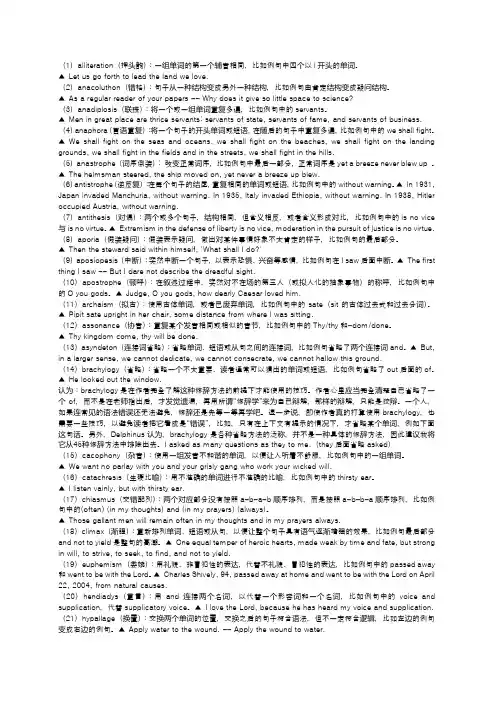
(1)alliteration(押头韵):一组单词的第一个辅音相同,比如例句中四个以l开头的单词。
▲Let us go forth to lead the land we love.(2)anacoluthon(错格):句子从一种结构变成另外一种结构,比如例句由肯定结构变成疑问结构。
▲As a regular reader of your papers -- Why does it give so little space to science?(3)anadiplosis(联珠):将一个或一组单词重复多遍,比如例句中的servants。
▲Men in great place are thrice servants: servants of state, servants of fame, and servants of business. (4)anaphora(首语重复):将一个句子的开头单词或短语,在随后的句子中重复多遍,比如例句中的we shall fight。
▲We shall fight on the seas and oceans, we shall fight on the beaches, we shall fight on the landing grounds, we shall fight in the fields and in the streets, we shall fight in the hills.(5)anastrophe(词序倒装): 改变正常词序,比如例句中最后一部分,正常词序是yet a breeze never blew up 。
▲The helmsman steered, the ship moved on, yet never a breeze up blew.(6)antistrophe(逆反复):在每个句子的结尾,重复相同的单词或短语,比如例句中的without warning。
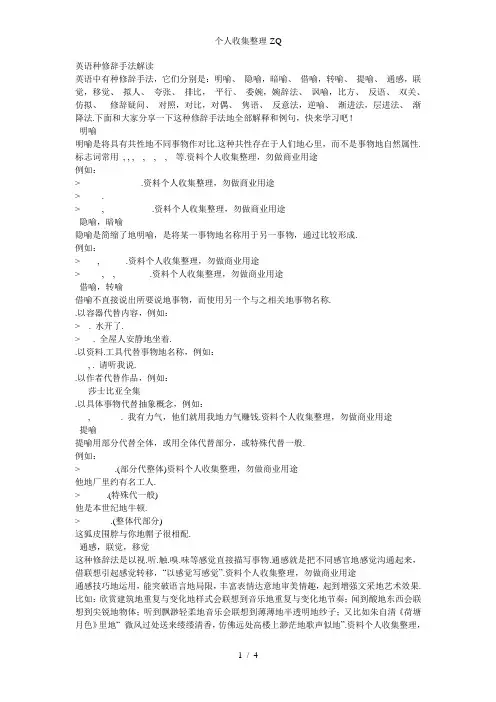
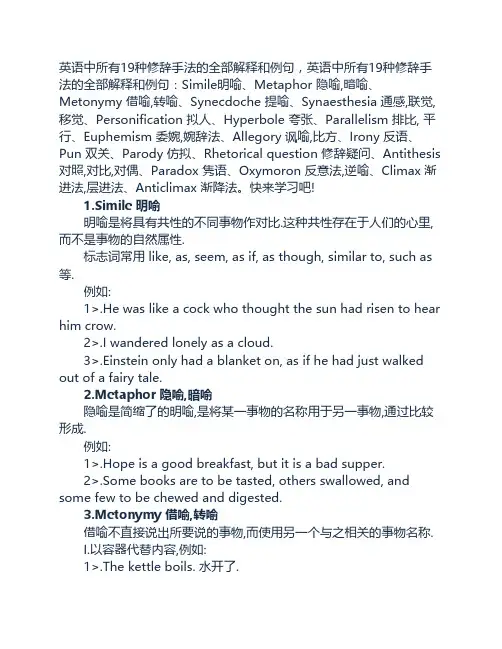
英语中所有19种修辞手法的全部解释和例句,英语中所有19种修辞手法的全部解释和例句:Simile明喻、Metaphor 隐喻,暗喻、Metonymy 借喻,转喻、Synecdoche 提喻、Synaesthesia 通感,联觉,移觉、Personification 拟人、Hyperbole 夸张、Parallelism 排比, 平行、Euphemism 委婉,婉辞法、Allegory 讽喻,比方、Irony 反语、Pun 双关、Parody 仿拟、Rhetorical question 修辞疑问、Antithesis 对照,对比,对偶、Paradox 隽语、Oxymoron 反意法,逆喻、Climax 渐进法,层进法、Anticlimax 渐降法。
快来学习吧! 1.Simile 明喻 明喻是将具有共性的不同事物作对比.这种共性存在于人们的心里,而不是事物的自然属性. 标志词常用 like, as, seem, as if, as though, similar to, such as 等. 例如: 1>.He was like a cock who thought the sun had risen to hear him crow. 2>.I wandered lonely as a cloud. 3>.Einstein only had a blanket on, as if he had just walked out of a fairy tale. 2.Metaphor 隐喻,暗喻 隐喻是简缩了的明喻,是将某一事物的名称用于另一事物,通过比较形成. 例如: 1>.Hope is a good breakfast, but it is a bad supper. 2>.Some books are to be tasted, others swallowed, and some few to be chewed and digested. 3.Metonymy 借喻,转喻 借喻不直接说出所要说的事物,而使用另一个与之相关的事物名称. I.以容器代替内容,例如: 1>.The kettle boils. 水开了. 2>.The room sat silent. 全屋人安静地坐着. II.以资料.工具代替事物的名称,例如: Lend me your ears, please. 请听我说. III.以作者代替作品,例如: a complete Shakespeare 莎士比亚全集 VI.以具体事物代替抽象概念,例如: I had the muscle, and they made money out of it. 我有力气,他们就用我的力气赚钱. 4.Synecdoche 提喻 提喻用部分代替全体,或用全体代替部分,或特殊代替一般. 例如: 1>.There are about 100 hands working in his factory.(部分代整体) 他的厂里约有100名工人. 2>.He is the Newton of this century.(特殊代一般) 他是本世纪的牛顿. 3>.The fox goes very well with your cap.(整体代部分) 这狐皮围脖与你的帽子很相配. 5.Synaesthesia 通感,联觉,移觉 这种修辞法是以视.听.触.嗅.味等感觉直接描写事物.通感就是把不同感官的感觉沟通起来,借联想引起感觉转移,“以感觉写感觉”。
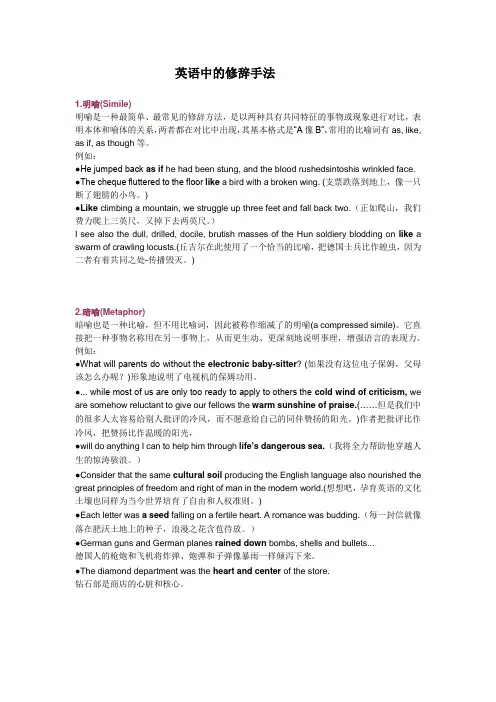
英语中的修辞手法1.明喻(Simile)明喻是一种最简单、最常见的修辞方法,是以两种具有共同特征的事物或现象进行对比,表明本体和喻体的关系,两者都在对比中出现,其基本格式是“A像B”,常用的比喻词有as, like, as if, as though等。
例如:●He jumped back as if he had been stung, and the blood rushedsintoshis wrinkled face.●The cheque fluttered to the floor like a bird with a broken wing. (支票跌落到地上,像一只断了翅膀的小鸟。
)●Like climbing a mountain, we struggle up three feet and fall back two.(正如爬山,我们费力爬上三英尺,又掉下去两英尺。
)I see also the dull, drilled, docile, brutish masses of the Hun soldiery blodding on like a swarm of crawling locusts.(丘吉尔在此使用了一个恰当的比喻,把德国士兵比作蝗虫,因为二者有着共同之处-传播毁灭。
)2.暗喻(Metaphor)暗喻也是一种比喻,但不用比喻词,因此被称作缩减了的明喻(a compressed simile)。
它直接把一种事物名称用在另一事物上,从而更生动、更深刻地说明事理,增强语言的表现力。
例如:●What will parents do without the electronic baby-sitter? (如果没有这位电子保姆,父母该怎么办呢?)形象地说明了电视机的保姆功用。
●... while most of us are only too ready to apply to others the cold wind of criticism, we are somehow reluctant to give our fellows the warm sunshine of praise.(……但是我们中的很多人太容易给别人批评的冷风,而不愿意给自己的同伴赞扬的阳光。
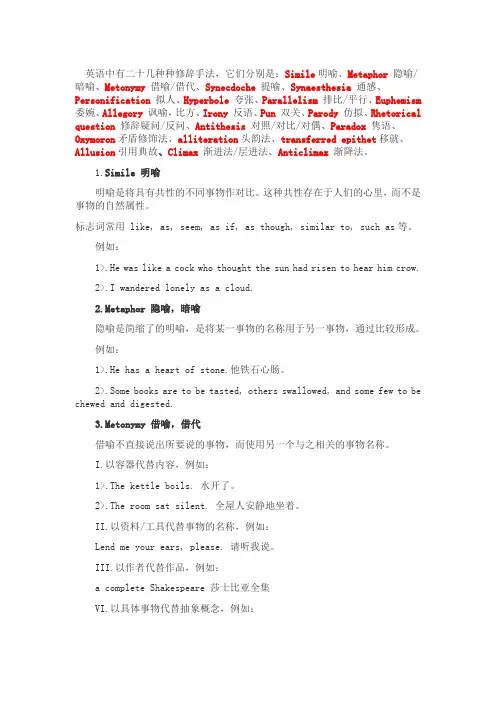
英语中有二十几种种修辞手法,它们分别是:Simile明喻、Metaphor隐喻/暗喻、Metonymy借喻/借代、Synecdoche提喻、Synaesthesia 通感、Personification拟人、Hyperbole夸张、Parallelism排比/平行、Euphemism 委婉、Allegory 讽喻,比方、Irony反语、Pun双关、Parody仿拟、Rhetorical question修辞疑问/反问、Antithesis对照/对比/对偶、Paradox隽语、Oxymoron矛盾修饰法、alliteration头韵法、transferred epithet移就、Allusion引用典故、Climax渐进法/层进法、Anticlimax渐降法。
1.Simile 明喻明喻是将具有共性的不同事物作对比。
这种共性存在于人们的心里,而不是事物的自然属性。
标志词常用 like, as, seem, as if, as though, similar to, such as等。
例如:1>.He was like a cock who thought the sun had risen to hear him crow.2>.I wandered lonely as a cloud.2.Metaphor 隐喻,暗喻隐喻是简缩了的明喻,是将某一事物的名称用于另一事物,通过比较形成。
例如:1>.He has a heart of stone.他铁石心肠。
2>.Some books are to be tasted, others swallowed, and some few to be chewed and digested.3.Metonymy 借喻,借代借喻不直接说出所要说的事物,而使用另一个与之相关的事物名称。
I.以容器代替内容,例如:1>.The kettle boils. 水开了。
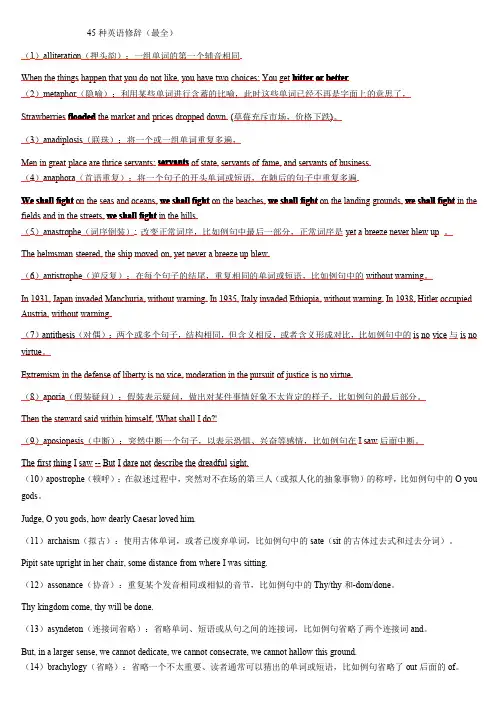
45种英语修辞(最全)(1)alliteration(押头韵):一组单词的第一个辅音相同.When the things happen that you do not like,you have two choices:You get bitter or better(2)metaphor(隐喻):利用某些单词进行含蓄的比喻,此时这些单词已经不再是字面上的意思了,Strawberries flooded the market and prices dropped down.(草莓充斥市场,价格下跌)。
(3)anadiplosis(联珠):将一个或一组单词重复多遍,Men in great place are thrice servants:servants of state,servants of fame,and servants of business.(4)anaphora(首语重复):将一个句子的开头单词或短语,在随后的句子中重复多遍.We shall fight on the seas and oceans,we shall fight on the beaches,we shall fight on the landing grounds,we shall fight in the fields and in the streets,we shall fight in the hills.(5)anastrophe(词序倒装):改变正常词序,比如例句中最后一部分,正常词序是yet a breeze never blew up。
The helmsman steered,the ship moved on,yet never a breeze up blew.(6)antistrophe(逆反复):在每个句子的结尾,重复相同的单词或短语,比如例句中的without warning。
In1931,Japan invaded Manchuria,without warning.In1935,Italy invaded Ethiopia,without warning.In1938,Hitler occupied Austria,without warning.(7)antithesis(对偶):两个或多个句子,结构相同,但含义相反,或者含义形成对比,比如例句中的is no vice与is no virtue。
20种英语修辞手法整理英语修辞手法是英语写作中常用的一种技巧,通过巧妙地运用修辞手法,可以增加文章的表现力和吸引力,使读者更加有兴趣阅读。
本文将整理介绍20种常见的英语修辞手法。
一、比喻(Metaphor)比喻是一种常见的修辞手法,用于通过将两个不相干的事物进行比较,以增强表达的效果。
例如:“他是一只勇敢的狮子。
”二、暗喻(Implicit Metaphor)暗喻是一种通过隐晦的方式进行比喻的修辞手法,不直接明示被比较的事物。
例如:“他是个夜猫子。
”三、拟人(Personification)拟人是将非人事物赋予人的特质或行为的修辞手法。
例如:“大地张开了它温暖的怀抱。
”四、夸张(Hyperbole)夸张是一种通过夸大事物的说法来产生强烈效果的修辞手法。
例如:“我等了一万年。
”五、对比(Contrast)对比是一种通过将两个不同或相反的事物进行相互对比,以突出差异或强调某一方面的修辞手法。
例如:“他的言行恰恰相反。
”六、排比(Parallelism)排比是一种通过对句子或短语进行平行结构的修辞手法,以强调重点或增加语句的节奏感。
例如:“奋斗,拼搏,追求,努力。
”七、倒装(Inversion)倒装是一种颠倒语序的修辞手法,常常用于疑问句或为了强调某一部分。
例如:“Never have I seen such a beautiful sunset.”八、反问(Rhetorical Question)反问是一种用疑问句的形式表达肯定或否定的修辞手法,常用于强调某一观点或引起读者思考。
例如:“难道你不想成功吗?”九、比较(Comparison)比较是通过将两个事物进行对比,以凸显共同点或差异的修辞手法。
例如:“学习就像是爬山,充满了艰辛和挑战。
”十、设问(Hypophora)设问是一种在文章中提出问题,并在下文中进行回答的修辞手法,常用于引起读者的关注和思考。
例如:“你知道成功的秘诀是什么吗?答案很简单——努力。
英语19种修辞手法的全部解释和例句英语中有19种修辞手法,它们分别是:Simile明喻、Metaphor 隐喻,暗喻、Metonymy 借喻,转喻、Synecdoche 提喻、Synaesthesia 通感,联觉,移觉、Personification 拟人、Hyperbole 夸张、Parallelism 排比,平行、Euphemism 委婉,婉辞法、Allegory 讽喻,比方、Irony 反语、Pun 双关、Parody 仿拟、Rhetorical question 修辞疑问、Antithesis 对照,对比,对偶、Paradox 隽语、Oxymoron 反意法,逆喻、Climax 渐进法,层进法、Anticlimax 渐降法。
下面和大家分享一下这19种修辞手法的全部解释和例句,快来学习吧!1.Simile 明喻明喻是将具有共性的不同事物作对比。
这种共性存在于人们的心里,而不是事物的自然属性。
标志词常用 like, as, seem, as if, as though, similar to, such as等。
例如:1>.He was like a cock who thought the sun had risen to hear him crow。
2>.I wandered lonely as a cloud。
3>.Einstein only had a blanket on, as if he had just walked out of a fairy tale。
2.Metaphor 隐喻,暗喻隐喻是简缩了的明喻,是将某一事物的名称用于另一事物,通过比较形成。
例如:1>.Hope is a good breakfast, but it is a bad supper。
2>.Some books are to be tasted, others swallowed, and some few to be chewed and digested。
一、明喻(simile)是以两种具有相同特征的事物和现象进行对比,表明本体和喻体之间的相似关系,两者都在对比中出现。
常用比喻词like,as, as if, as though等,补充:二、隐喻(metaphor)这种比喻不通过比喻词进行,而是直接将用事物当作乙事物来描写,甲乙两事物之间的联系和相似之处是暗含的。
补充:三、提喻(synecdoche)又称举隅法,主要特点是局部代表全体,或以全体喻指部分,或以抽象代具体,或以具体代抽象。
四、拟人(personification)这种修辞方法是把人类的特点、特性加于外界事物之上,使之人格化,以物拟人,以达到彼此交融,合二为一。
五、夸张(hyperbole)这是运用丰富的想象,过激的言词,渲染和装饰客观事物,以达到强调的效果.六、叠言(rhetorical repetition)这种修辞法是指在特定的语境中,将相同的结构,相同意义词组成句子重叠使用,以增强语气和力量。
七、借代(metonymy)是指两种不同事物并不相似,但又密不可分,因而常用其中一种事物名称代替另一种。
八、双关语(pun)是以一个词或词组,用巧妙的办法同时把互不关联的两种含义结合起来,以取得一种诙谐有趣的效果。
九、拟声(onomatcpocia)是摹仿自然界中非语言的声音,其发音和所描写的事物的声音很相似,使语言显得生动,富有表现力. 十、讽刺(irony)是指用含蓄的褒义词语来表示其反面的意义,从而达到使本义更加幽默,更加讽刺的效果.十一、通感(synesthesia)是指在某个感官所产生的感觉,转到另一个感官的心理感受。
十二、头韵法(alliteration)在文句中有两个以上连结在一起的词或词组,其开头的音节有同样的字母或声音,以增强语言的节奏感。
英语修辞手法1)Simile:(明喻)It is a figure of speech which makes a comparison between two unlike elements having at least one quality or characteristic (特性)in common. To make the comparison, words like as, as.。
英语13种修辞手法比喻(Metaphor):通过比较两个不同的事物来进行形象化的描述。
例句:Her laughter was music to my ears.(她的笑声如音乐般动听。
)拟人(Personification):将非人物赋予人类特征和行为。
例句:The flowers danced in the gentle breeze.(花儿在轻风中跳舞。
)暗示(Allusion):通过引用其他文学作品、历史事件或文化象征来传达特定的含义。
例句:He was a real Romeo with the ladies.(他对女士们来说就像真正的罗密欧。
)反问(Rhetorical Question):用问句表达观点或意义,而不需要回答。
例句:Isn't it ironic that the firefighter's house burned down?(消防员的房子烧毁了,这不是讽刺吗?)平行结构(Parallelism):重复使用相同的语法结构,增强语言的韵律和效果。
例句:He came, he saw, he conquered.(他来了,他看到了,他征服了。
)排比(Anaphora):在连续的句子或短语中重复相同的词或短语,以增强语义和节奏。
例句:I came, I saw, I conquered.(我来了,我看到了,我征服了。
)夸张(Hyperbole):夸大事物的程度或规模,以强调其重要性或产生效果。
例句:I've told you a million times not to do that!(我已经告诉你一百万次不要那样做了!)比较(Simile):通过使用"like"或"as"等词来比较两个事物,以形象地表达相似之处。
例句:She sings like an angel.(她唱歌如天使一般。
)反复(Repetition):重复使用词语、短语或句子,以增强表达的力度和记忆性。
英语语法:英语的19种修辞手法分析英语中有19种修辞手法分别是:Simile明喻、Metaphor 隐喻,暗喻、Metonymy 借喻,转喻、Synecdoche 提喻、Synaesthesia 通感,联觉,移觉、Personification 拟人、Hyperbole 夸张、Parallelism 排比,平行、Euphemism 委婉,婉辞法、Allegory 讽喻,比方、Irony 反语、Pun 双关、Parody 仿拟、Rhetorical question 修辞疑问、Antithesis 对照,对比,对偶、Paradox 隽语、Oxymoron 反意法,逆喻、Climax 渐进法,层进法、Anticlimax 渐降法。
英语的19种修辞手法具体用法:1.Simile 明喻明喻是将具有共性的不同事物作对比。
这种共性存在于人们的心里,而不是事物的自然属性。
标志词常用 like, as, seem, as if, as though, similar to, such as 等。
例如:1.He was like a cock who thought the sun had risen to hear him crow。
2.I wandered lonely as a cloud。
3.Einstein only had a blanket on, as if he had just walked out ofa fairy tale。
2.Metaphor 隐喻,暗喻隐喻是简缩了的明喻,是将某一事物的名称用于另一事物,通过比较形成。
例如:1.Hope is a good breakfast, but it is a bad supper。
2.Some books are to be tasted, others swallowed, and some few to be chewed and digested。
英语修辞手法总结归纳英语修辞手法总结归纳:明喻、转喻、提喻、隐喻、拟人、拟声、夸张、双关、讽刺、联觉、头韵、委婉、修辞反问、隽语、对照、渐进法、渐降法、引用、叠言、仿拟、排比、寓言。
一、明喻(Simile)是以两种具有相同特征的事物和现象进行对比,表明本体和喻体之间的相似关系,两者都在对比中出现。
常用比喻词like, as, as if, as though,seem,similar to, such as等,Eg:1. This elephant is like a snake as anybody can see.这头象和任何人见到的一样像一条蛇。
二、隐喻(Metaphor)这种比喻不通过比喻词进行,而是直接将用事物当作乙事物来描写,甲乙两事物之间的联系和相似之处是暗含的。
Eg:1、He is a pig.他简直是头猪。
(比喻:他是一个像猪一般的人,指肮脏,贪吃的人。
)三、提喻(Synecdoche)提喻大致归纳为四种情况:a.部分和全体互代;b.以材料代替事物;c.抽象和具体互代;d.以个体代替整个类。
Eg:1. Have you any coppers? 你有钱吗?(以材料代事物,即以copper铜喻指coin money铜币)四、拟人(Personification)这种修辞方法是把人类的特点、特性加于外界事物之上,使之人格化,以物拟人,以达到彼此交融,合二为一。
拟人是把生命赋予无生命的事物.Eg:I was very happy and could hear the birds singing in the woods.(把鸟拟人化)我很高兴,也能听到鸟儿在树林里唱歌。
五、夸张(Hyperbole)这是运用丰富的想象,过激的言词,渲染和装饰客观事物,以达到强调的效果,也就是夸张化。
Eg:1.My blood froze.我的血液都凝固了。
六、转喻(Metonymy)是指当甲事物同乙事物不相类似,但有密切关系时,可以利用这种关系,以乙事物的名称来取代甲事物,这样的一种修辞手段。
1. 比喻(metaphor)比喻就是打比方。
可分为明喻和暗喻:明喻(simile): A figure of speech in which two essentially unlike things are compared. 明喻:一种修辞手法,把两种基本不相像的东西进行比较.用like, as, as...as, as if(though) 或用其他词语指出两个不同事物的相似之处。
例如:“How like the winter hath my absence been”or “So are you to my thoughts as food to life” (Shakespeare). 如“我的离开好象是冬天来临” 或“你对我的思想就象食物对于生命一样重要” (莎士比亚)O my love's like a red, red rose. 我的爱人像一朵红红的玫瑰花。
The man can't be trusted. He is as slippery as an eel. 那个人不可信赖。
他像鳗鱼一样狡猾。
He jumped as if he had been stung.他像被蜇了似的跳了起来。
Childhood is like a swiftly passing dream. 童年就像一场疾逝的梦。
暗喻(metaphor):缩写met.,metaph. A figure of speech in which a word or phrase that ordinarily designates one thing is used to designate another, thus making an implicit comparison.用一个词来指代与该词所指事物有相似特点的另外一个事物。
例如:He has a heart of stone. 他有一颗铁石心肠。
The world is a stage. 世界是一个大舞台。
“a sea of troubles” “忧愁之海”“All the world's a stage”(Shakespeare) “整个世界一台戏”(莎士比亚)2. 换喻(metonymy) 用某一事物的名称代替另外一个与它关系密切的事物的名称,只要一提到其中一种事物,就会使人联想到另一种。
比如用the White House 代替美国政府或者总统,用the bottle来代替wine 或者alcohol,用the bar 来代替the legal profession,用crown代替king等。
例如:His purse would not allow him that luxury. 他的经济条件不允许他享受那种奢华。
The mother did her best to take care of the cradle. 母亲尽最大努力照看孩子。
He succeeded to the crown in 1848. 他在1848年继承了王位。
3. 举隅,提喻(synecdoche) 以局部代表整体(如用手代表水手),以整体代表局部(如用法律代表警官),以特殊代表一般(如用直柄剃刀代表杀人者),以一般代表特殊(如用贼代表扒手),或用原材料代表用该材料制造的东西(如用钢代表剑)例如:He earns his bread by writing. 他靠写作挣钱谋生。
The farms were short of hands during the harvest season. 在收获季节里农场缺乏劳动Australia beat Canada at cricket. 澳大利亚队在板球比赛中击败了加拿大队。
He is the Newton of this century. 他是这个世纪的牛顿。
4. 拟人(personification) 拟人,人格化:给无生命的东西或者抽象的东西赋予人的个性或绘以人的形象,把事物或者概念当作人或者具备人的品质的写法。
例如:Hunger sat shivering on the road 饥饿站在路上颤抖Flowers danced about the lawn 花儿在草地上翩翩起舞My heart was singing. 我的心在歌唱。
This time fate was smiling to him. 这一次命运朝他微笑了。
The flowers nodded to her while she passed. 当她经过的时候花儿向她点头致意。
The wind whistled through the trees. 风穿过树丛,树叶哗哗作响。
5. 委婉(euphemism) 用温和的、间接的词语代替生硬的、粗俗的词语,以免直接说出不愉快的事实冒犯别人或者造成令人窘迫、沮丧的局面。
例如:用to fall asleep; to cease thinking; to pass away; to go to heaven; to leave us 代替to die用senior citizens代替old people用 a slow learner或者an under achiever代替a stupid pupil用weight watcher代替fat people用mental hospital 代替madhouse或者asylum用emotionally disturbed代替mad用washroom, men's / women's room代替lavatory用handicapped代替crippled用low income brackets; underprivileged; disadvantaged 代替poor people6. 双关(pun) 用同音异义或者一词二义来达到诙谐幽默的效果:表面上是一个意思,而实际上却暗含另一个意思,这种暗含的意思才是句子真正的目的所在。
例如:A cannonball took off his legs, so he laid down his arms. (arms可指手臂或者武器)一发炮弹打断了他的腿,所以他缴械投降了。
“Can I try on that gown in the window” asked a would-be customer.“Certainly not, madam!” replied the salesman. 我可以试穿一下橱窗里的那件睡袍吗或者:我可以在橱窗里试穿那件睡袍吗Seven days without water make one weak (week). 七天没有水使一个人虚弱。
或者:七天没有水就是一周没有水。
7. 反语(irony) 使用与真正意义相反的词,正话反说或者反话正说,从对立的角度运用词义来产生特殊的效果。
下面就是莎士比亚的戏剧Julius Caesar 中的一个运用反语的很好的例子,Brutus出于野心刺杀了Caesar, Caesar 的好友Antony 讥讽Brutus 说:Here, under leave of Brutus and the rest—For Brutus is an honorable man;So are they all, all honorable men—Come I to speak in Caesar's funeral.He was my friend, faithful and just to me:But Brutus says he was ambitious;And Brutus is an honorable man.在Antony 的话里反复使用honorable这个词就是一个反语的例子。
8. 矛盾修饰(oxymoron) 把相互矛盾的两个词用在一起的修辞方法。
它利用词义表面的相互矛盾使表层的不和谐统一在思想内容的深层,从而揭示事物对立统一的本质特征,达到加深印象的目的。
例如:deafening silence震耳欲聋的沉默a mournful optimist. 悲伤的乐观She read the long-awaited letter with a tearful smile. 她带着含泪的微笑读那封盼望已久的信。
The coach had to be cruel to be kind to his trainees.教练为了对他的受训者仁慈就要对他们残酷。
During his useful life he often felt he was useless. 在他大有作为的一生中他老是感到自己无用。
其他还有sweet pain; thunderous silence; luxurious poverty; heavy lightness; living death; impossible hope 等等。
9. 轭式搭配(zeugma) 把适用于某一事物的词语顺势用到另外一事物上的方法。
在同一个句子里一个词可以修饰或者控制两个或更多的词,它可以使语言活泼,富有幽默感。
例如:She opened the door and her heart to the homeless boy. 她对那无家可归的男孩打开了房门,也敞开了胸怀。
As I left home after breakfast, I shivered inwardly as well as outwardly. 早餐之后我离开家的时候,我的里里外外都在颤抖。
I would my horse had the speed of your tongue. 我希望我的马能有你的舌头的速度。
10. 移位修饰(transferred epithet) 将本应该用来修饰某一类名词的修饰语用来修饰另一类名词。
例如:There was a short, thoughtful silence. 出现了一阵短暂的、令人沉思的寂静。
The old man put a reassuring hand on my shoulder. 老人把一只令人安心的手放在我的肩膀上。
He closed his busy life at the age of sixty. 在六十岁时他结束了他那忙碌的一生。
This is the cheapest market in this country. 这是这个国家最便宜的市场了。
11. 头韵(alliteration) 两个或者更多的词以相同的音韵或者字母开头就构成头韵。
例如:proud as a peacockblind as a batsafe and soundon scrolls of silver snowy sentences”(Hart Crane) “写满银色雪般句子的卷轴上”(哈特·克兰) Long and loudly little Lily laughed. 小莉莉长时间地、大声地笑着。